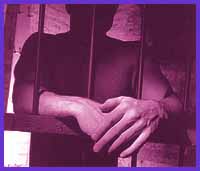Male prison rape fantasies can be a sign of good psychological health.
“One of the theories is that people who are into rape fantasies or domination and submissive type fantasies are, in fact, switching a psychological fear of being dominated or hurt or humiliated or whatever and – by sexualizing it – turning it into something they have control over,” says Dr Paul Federoff, a psychiatrist at the Clarke Institute.
And control may be gained by fantasizing about being dominated or dominating.
For many gay men, jail provides the perfect backdrop for fantasy and erotica. The pen is all guy, all the time – and much more.
“I think the fantasy of what prisons are like plays into that idea of a sort of military type of set-up in which there’s a lot of rules and regulations. And there’s a lot of control going in the way people behave towards each other.
“And then you have this kind of counter-effect of this sexual thing that kind of breaks through this controlled aspect.”
Federoff says the reason for sexually fantasizing about strict rules – and subverting them – goes back to childhood.
“If a person has a frightening or scary or unpleasant experience that they’ve dealt with when they were a child or early adolescent, they have two choices.
“Either they can go through life believing that the world is horrible and cruel or they can kind of switch it around and reinterpret that event as being a positive one. And if that also becomes sexualized, it often becomes a powerful part of the Love Map.”
(The Love Map is a theoretical guide that sets your lifetime sexual route and is supposedly created when you’re a kid.)
Federoff says these ground-altering childhood events range from a scary bedtime story to being locked in the closet.
Of course, Federoff says that having the rape fantasy by no means indicates someone wants to be raped in prison – or anywhere. Fantasy and reality are two separate things.
Fadi Abou-Rihan, a psychoanalyst with a doctorate of philosophy, also stresses the difference.
But he offers a bit of a different take on the whole male-prison-rape-fantasy-thing. He says the prison setting could make a known backdrop for fantasies that are just an extension of everyday life.
“It picks up on this power differential and exaggerates it. It makes it very obvious. So, fantasizing about having prison sex may have nothing to do with the prisons, it just might be picking up on the fact that there is a power indifference between individuals and giving it a voice and making it implicit.”
It’s taking one aspect of sex and magnifying it.
Abou-Rihan adds: “The idea that sex between people is equal is a very suspect idea.”
He says the reasons people turn to the prison setting for fantasy varies for each individual.
Whatever the reason, Abou-Rihan doesn’t see it leading to real rape. And unlike the act itself, he says fantasies can’t be judged good or bad.
“It has to be appreciated – not judged.”

 Why you can trust Xtra
Why you can trust Xtra


